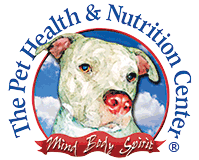Taurine for Dogs and Cats
What is taurine for dogs and cats?
Taurine is an amino sulfonic acid, but it is often referred to as an amino acid, a chemical that is a required building block of protein. Taurine is found in large amounts in the brain, retina, heart, and blood cells called platelets. The best food sources for taurine are meat and fish. In most animals it is a “conditional amino acid” in that it can be synthesized by the body. However, in members of the cat family, it becomes an “essential amino acid” because it can not be manufactured by the body and must be provided by the diet.
Taurine is essential for cardiovascular function, the development and function of skeletal muscle, retinal health and the function of the central nervous system. If you feed a commercial processed pet food (canned or kibble diet) that is likely low in natural taurine, it will contain a synthetic substance produced in a laboratory by a chemical process but still misleadingly referred to as taurine on the label.
Is taurine an essential amino acid for dogs and cats?
For dogs taurine is a “conditional amino acid” meaning it can be manufactured by the body from other amino acids. However, for cats it is an “essential amino acid”. In the body the biosynthesis of taurine begins in the pancreas with the enzyme cysteine dioxygenase (CDO) converting the amino acid L-cysteine to cysteine sulfinate followed by the oxidation of hypotaurine to taurine. Cats lack the enzyme necessary to produce taurine and must therefore acquire it from their diet. The absence of taurine causes a cat's retina to slowly degenerate, causing eye problems and (eventually) irreversible blindness – a condition known as central retinal degeneration (CRD) as well as hair loss, tooth decay and feline dilated cardiomyopathy leading to heart failure. The availability of taurine is affected depending on how the food is prepared, with raw diets retaining the most taurine, and baking or boiling resulting in the greatest taurine loss.
What is taurine good for in dogs and cats?
Taurine plays a role in many physiological functions, however for the purpose of this answer we will describe what taurine is primarily used for with dogs and cats. Taurine plays a role in the maintenance of normal contractile function of the heart. Without sufficient taurine in the diet, or the essential amino acids that form taurine, an animal can develop dilated cardiomyopathy. This is a condition in which the heart's ability to pump blood is decreased because the heart's main pumping chamber, the left ventricle, is enlarged and weakened. This can lead to heart failure if taurine is not added to the diet soon enough. A taurine deficiency can also cause an animal’s retina to slowly degenerate, causing eye problems and (eventually) irreversible blindness. This condition, called central retinal degeneration (CRD), is not reversible with taurine supplementation. Because taurine aids in the movement of potassium, sodium, and calcium in and out of the cells, sufficient levels are important for the normal functioning of skeletal muscle contraction.
What foods contain taurine for dogs and cats?
The highest amounts of taurine can be found in shellfish, especially scallops, mussels, and clams. For dogs and cats the highest levels can be found in the dark meat of turkey and chicken but is found in all meat and fish.You can find particularly large amounts of taurine in the brain and heart; this is why we recommend a heart glandular that contains natural taurine for our clients with heart conditions. The availability of taurine is affected depending on how the food is prepared, with raw diets retaining the most taurine, and baking or boiling resulting in the greatest taurine loss.
How much taurine for dogs and cats?
Studies suggest taurine should be supplied at 10 mg/kg (5 mg/lb) of body weight per day for domestic cats. Supplementation is not necessary if cats are fed a raw meat diet. The story is similar for dogs as they obtain all they need from a raw meat diet. Dogs differ from cats because their body can synthesize taurine. However they need sufficient quantities of the amino acid methionine start the process. This can be found in sufficient quantities in meat and fish but must be supplemented in diets deficient in real meat like many processed pet foods.
What does taurine do for dogs and cats?
Taurine provides most animals with an important “conditional” amino acid (meaning it can be synthesized from other amino acids) that is extremely important to their cardiovascular health, the development and function of skeletal muscle, retinal health and the function of the central nervous system. For animals in the cat family taurine is even more important because it is an “essential” amino acid because it must be provided in the diet.
Where can I buy taurine for dogs and cats?
Synthetic taurine supplements can be found anywhere. However, if you would like a natural taurine supplement for your dog or cat you should try our Heart Glandular. This heart tissue is a superb natural source of taurine from grass-fed New Zealand cows that will help to keep your animal’s heart and eyes healthy.
References
Taurine: a very essential amino acid. Retrieved from: https://www.ncbi.nlm.nih.gov/pmc/articles/PMC3501277/
Taurine. Retrieved from: https://www.webmd.com/vitamins/ai/ingredientmono-1024/taurine
Taurine and skeletal muscle function. Retrieved from: https://www.ncbi.nlm.nih.gov/pubmed/25415270

